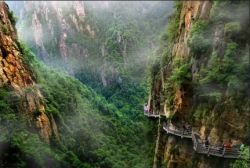Difference between revisions of "Tiantai Mountain"
imported>Ciic |
imported>Ciic |
||
| Line 1: | Line 1: | ||
| − | [[File:Qiongtaixiangu scenic spot on Tiantai Mountain.jpg|thumb|Qiongtaixiangu scenic spot on Tiantai Mountain]] | + | [[File:Qiongtaixiangu scenic spot on Tiantai Mountain.jpg|250px|thumb|Qiongtaixiangu scenic spot on Tiantai Mountain]] |
Located in the northern part of Tiantai County under the jurisdiction of Tiantai City, the main peak of '''Tiantai Mountain''' (http://www.chinaculture.org/gb/en_travel/2003-09/24/content_35014.htm) is Mt. Huading, 1,138 m above sea level. It is the birthplace of the well-known Chinese monk Jigong of the Tiantai Sect of Buddhism, as well as the ancestral shrine of the Tiantai Sect of Japan and the Republic of Korea. Among its many appealing scenic spots are Mt. Huading and the Shiliang Flying Waterfall. Guoqing Temple, the ancestral temple of the Tiantai Sect, was first built in 598 and has enjoyed the fame as one of the “ten famous temples south of the Yangtze River” since the [[Southern Song Dynasty]] (1127-1279). The mountain also boasts cliff carvings of calligraphic works by China’s top masters, such as [[Wang Xizhi]], [[Liu Gongquan]], [[Huang Tingjian]], [[Mi Fu]], and [[Zhu Xi]], all of which are well preserved. | Located in the northern part of Tiantai County under the jurisdiction of Tiantai City, the main peak of '''Tiantai Mountain''' (http://www.chinaculture.org/gb/en_travel/2003-09/24/content_35014.htm) is Mt. Huading, 1,138 m above sea level. It is the birthplace of the well-known Chinese monk Jigong of the Tiantai Sect of Buddhism, as well as the ancestral shrine of the Tiantai Sect of Japan and the Republic of Korea. Among its many appealing scenic spots are Mt. Huading and the Shiliang Flying Waterfall. Guoqing Temple, the ancestral temple of the Tiantai Sect, was first built in 598 and has enjoyed the fame as one of the “ten famous temples south of the Yangtze River” since the [[Southern Song Dynasty]] (1127-1279). The mountain also boasts cliff carvings of calligraphic works by China’s top masters, such as [[Wang Xizhi]], [[Liu Gongquan]], [[Huang Tingjian]], [[Mi Fu]], and [[Zhu Xi]], all of which are well preserved. | ||
[[category:mountain]] | [[category:mountain]] | ||
Latest revision as of 05:21, 4 June 2012
Located in the northern part of Tiantai County under the jurisdiction of Tiantai City, the main peak of Tiantai Mountain (http://www.chinaculture.org/gb/en_travel/2003-09/24/content_35014.htm) is Mt. Huading, 1,138 m above sea level. It is the birthplace of the well-known Chinese monk Jigong of the Tiantai Sect of Buddhism, as well as the ancestral shrine of the Tiantai Sect of Japan and the Republic of Korea. Among its many appealing scenic spots are Mt. Huading and the Shiliang Flying Waterfall. Guoqing Temple, the ancestral temple of the Tiantai Sect, was first built in 598 and has enjoyed the fame as one of the “ten famous temples south of the Yangtze River” since the Southern Song Dynasty (1127-1279). The mountain also boasts cliff carvings of calligraphic works by China’s top masters, such as Wang Xizhi, Liu Gongquan, Huang Tingjian, Mi Fu, and Zhu Xi, all of which are well preserved.
